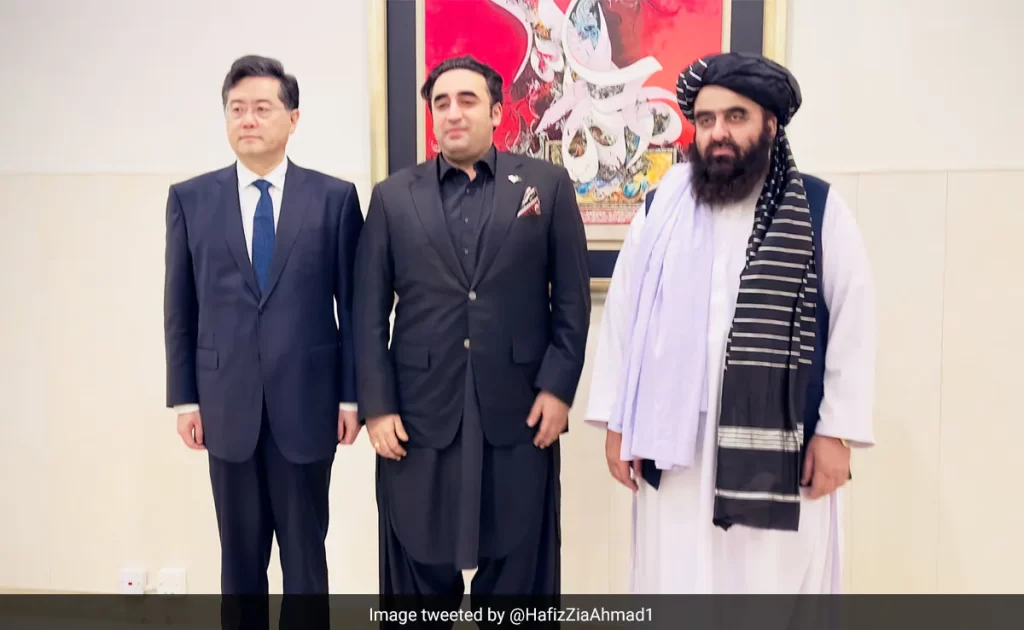The Taliban agreed to extend the Belt and Road Initiative to Afghanistan, potentially bringing in billions of dollars to fund infrastructure projects in the sanctions-hit country.
On Saturday, Chinese Foreign Minister Qin Gang and his Pakistani counterpart Bilawal Bhutto Zardari met in Islamabad. They agreed to collaborate on Afghanistan’s rehabilitation, including bringing the $60 billion China-Pakistan Economic Corridor to the Taliban-ruled country.
“The two sides agreed to continue their humanitarian and economic assistance for the Afghan people and enhance development cooperation in Afghanistan, including through extension of CPEC to Afghanistan,” according to a joint statement issued by Pakistan’s foreign ministry following the meeting.
Chinese and Pakistani officials had already explored expanding the project to Afghanistan, part of President Xi Jinping’s showpiece Belt and Road Initiative, which began nearly a decade ago. The Taliban government, short on funds, has expressed willingness to engage in the project and the potential of receiving much-needed infrastructure funding.
Amir Khan Muttaqi, the Taliban’s chief diplomat, traveled to Islamabad to meet with his Chinese and Pakistani counterparts and achieved an agreement, according to his deputy spokesman Hafiz Zia Ahmad over the phone.
Taliban agrees to extend China’s Belt And Road Initiative in Afghanistan.
The Taliban have also expressed anticipation that China will increase investments in the country’s abundant resources, which are believed to be worth $1 trillion. In January, the government signed its first deal to produce oil from the northern Amu Darya basin with a subsidiary of China National Petroleum Corporation.
The Chinese and Pakistani ministers also emphasized the importance of unfreezing Afghanistan’s foreign financial assets. On suspicion that the monies will be used for terrorist purposes, the Taliban has been barred from accessing around $9 billion of Afghanistan’s central bank reserves stored overseas.
Frozen Assets
After the Taliban placed some school and job limitations on Afghan women last year, Washington decided to release half of it to help the economy.
Terrorists-turned-administrators saw investments as a chance to revive a cash-strapped economy after international funding, which accounts for 60% of government spending, was curtailed following the disastrous withdrawal of US soldiers in 2021.
China, Russia, and Iran are among the few countries that have friendly relations with the Taliban. They have given the Taliban tens of millions of dollars in aid but have not formally recognized the administration.
According to a UN organization, the Taliban needs $4.6 billion this year to help more than two-thirds of the country’s 40 million people living in extreme poverty. According to a Gallup poll conducted in 2022, nine out of ten Afghans found it “difficult” or “very difficult” to survive on their current wage.
Due to attacks by the Islamic State group, which competes with the Taliban for influence, Chinese corporations have been apprehensive about investing in Afghanistan. In December, the extremist group claimed responsibility for an attack on a Kabul hotel frequented by Chinese diplomats and businessmen.
The presence of the East Turkistan Islamic Movement, a Xinjiang-based separatist group, has also made Beijing wary of increasing its power.
Muttaqi’s second journey to Pakistan comes only days after the United Nations emphasized the importance of engaging with the Taliban rulers as Afghanistan faces the world’s “largest” humanitarian crisis.
Also read: Afghan Taliban to cooperate with US in combating IS
